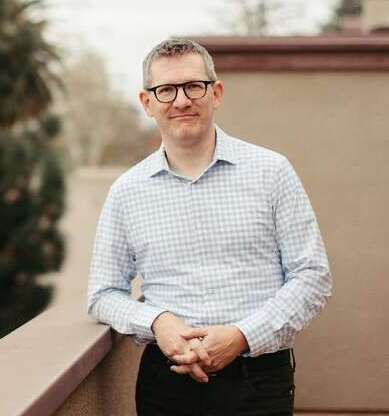It’s fitting that this year CPX’s Richard Johnson lecture will be live in person. It’s fitting because the topic of the lecture is ‘Disconnected: Why Technology Keeps Disappointing Us’.
And after two years of hosting the lecture remotely due to Covid, executive director of the Centre for Public Christianity (CPX) Simon Smart is looking forward to being back in the room – even if the topic makes him a little uncomfortable.
The speaker Andy Crouch, an expert on culture and faith, has tackled the impact of technology in several of his books, including The Life We’re Looking For: Reclaiming Relationship in a Technological World (2022), My Tech-Wise Life: Growing Up and Making Choices in a World of Devices (2020) and The Tech-Wise Family (2017).
“When I read Andy Crouch, it feels like the mirror is being held up to me. And I find it pretty challenging,” admits Smart.
“So I hope people will also really resonate with what he says and recognise some common aspects of modern life that are both pervasive, as well as sometimes a bit troubling.”
“He is urging us to not just sink into an unthinking environment in which we are just subject to our devices.” – Simon Smart, CPX
In his lecture Crouch will be asking the audience to consider (in Smart’s words), “Do we think carefully enough about technology and the technological age that we’re in – what are the benefits of that, but what are some of the costs?”
Crouch is not a technophobe, Smart is quick to add. He’s primarily a cultural researcher and theologian, as partner for theology and culture at Praxis, an organisation that focuses on redemptive entrepreneurship. He has also written other books – including Strong and Weak: Embracing a Life of Love, Risk and True Flourishing (2016) and Culture Making (2008) – and was executive editor of Christianity Today from 2012 to 2016.
“So he’s not anti-technology or saying we ought to chuck it all out,” Smart clarifies. “He’s very interested in thinking more carefully about technology and the ways that it serves us or, conversely, the ways that we can be subject to it. And also what might be lost – sacred things that might be lost when we pursue the promise of technology, which is so attractive and alluring, but don’t stop to think about the ways that it’s not serving us well or maybe even enslaving us.
“He also illuminates the deep questions about what it is to be human that emerge when we start to think about technology and community in relationships and what’s essential and unique about human beings. That, of course, opens up spiritual questions – questions around who we are. Are we designed for a particular purpose or not? The way we answer those sorts of questions will govern how we respond to technology.”
Smart stresses that Crouch’s message isn’t all bad news: “He is optimistic and hopeful that we can, with the right approach and the thoughtful approach, direct technology in ways that will help us to flourish and help those around us to flourish.
“But he is urging us to not just sink into an unthinking environment in which we are just subject to our devices. He thinks we can do better than that.”
“[The lecture] is meant to be the sort of thing that anyone would come to and get value out of.”
Crouch is just one of the “really good thinkers, writers and speakers” that CPX has brought to public audiences over the past nine years that the Richard Johnson Lecture has been held. The idea for the lecture was formed in 2014 when Richard Johnson College at Wollongong University was closing down, and so contributed some funds to establish the lecture. While the lecture was named after the college, Smart says its relation to the chaplain of the First Fleet – Reverend Richard Johnson, known as the “physician of soul and body” – is also appropriate.
“He was a much-loved chaplain. He attended to the normal duties of a chaplain, in terms of marrying people, burying people and being the pastor to the colony, and he took that job seriously. But in a broader sense, he also contributed to the lives of people under pretty challenging circumstances.
“So, he was known as the best farmer. He was very caring and helped people in great need. Richard Johnson had a very holistic, positive presence. He embodies something of the spirit of good public Christianity in indiscriminately caring for everyone. He was someone who’d received God’s mercy, and, therefore, he was going to participate in that by being an instrument of mercy and grace to the people around him.
“That feels like a good spirit on which to build a Christian public presence,” says Smart.
In the same way, CPX sees the Richard Johnson Lecture as a way of “contributing to the life of the cities where it takes place.” While the speakers are Christian, the lecture is intended to be “truly public.”
“It’s meant to be the sort of thing that anyone would come to and get value out of. The talks are about aspects of civil life that are of common interest, where we think a Christian perspective can offer something edifying and life-giving,” Smart explains.
“It emerged out of a desire to be part of the conversation that’s happening around the place, but also to elevate the spiritual element of those conversations, which we think is often a bit impoverished in Australian life. We hope this lecture can play a part in making that conversation easier and more fruitful.”
“[It’s] offering something not just challenging but also life-affirming.”
The theme of disconnection has been the focus of two other Richard Johnson lectures in recent years: Scott Stephens (online editor of the ABC’s Religion and Ethics) spoke on ‘Out of Sight: Attentiveness in a Dismissive Age’ in 2021, and Tim Dixon (co-founder of More in Common) spoke on ‘Crossing the Great Divide: Building Bridges in an Age of Tribalism’ in 2019.
Smart believes this is no coincidence: “We hope that the lectures are speaking into the cultural moment in a way that feels relevant and like it’s got something to say to people’s lives.
“It’s speaking into a period where there’s a lot of talk among psychologists, commentators and sociologists about the real disconnection, atomisation, loss of community and decline in civil life. Many people are talking about a loneliness epidemic and we’re all painfully aware of the polarised nature of public discussion.
“So, it is fitting that the Richard Johnson Lecture is speaking into those very real challenges for people today and hopefully offering something not just challenging but also life-affirming.”

Andy Crouch
The 2022 Richard Johnson Lecture – ‘Disconnected: Why Technology Keeps Disappointing Us’ with Andy Crouch – will be held in Sydney on September 1 (at the Art Gallery of NSW) and in Melbourne on September 5 (at Melbourne City Conference Centre), from 7.30-9.00 pm. For more information or to book, head to the CPX website.
Andy Crouch will also be speaking at Bible Society Australia’s inaugural Bible Conference in Sydney (at the Powerhouse Theatre and online) on September 2 at 6pm. Christine Caine will also be speaking at the conference, as well as Simon Smart and CEO of Bible Society, Grant Thomson. Both in-person and online tickets are available for a donation. For more information or to book, visit Bible Society Australia’s website.


